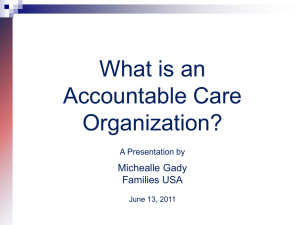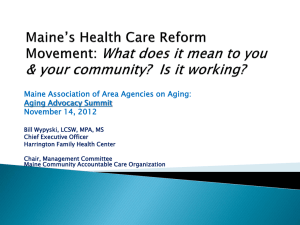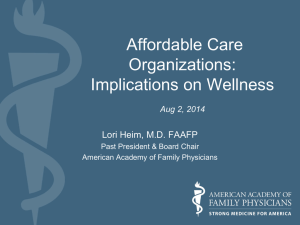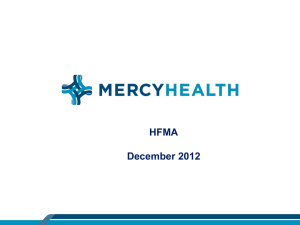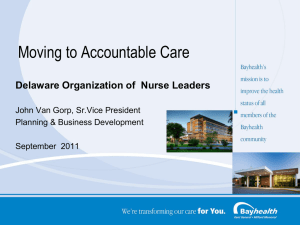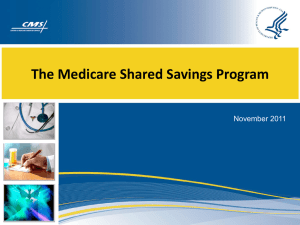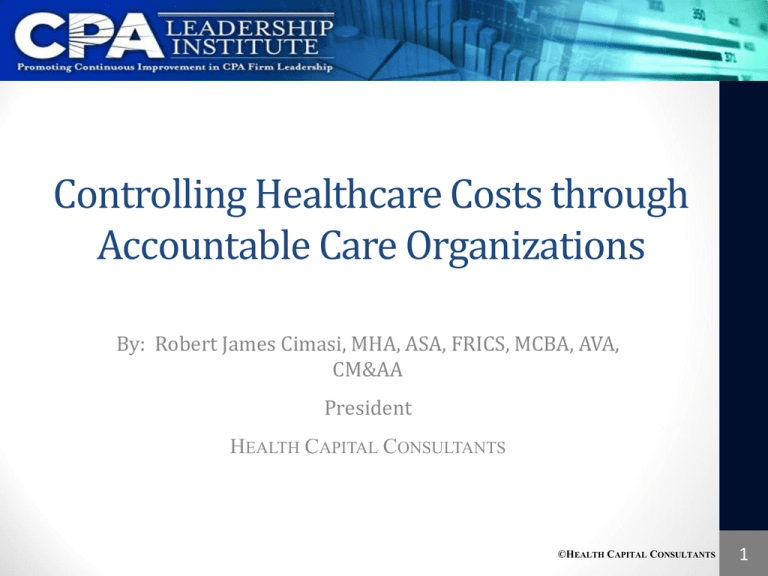
Controlling Healthcare Costs through
Accountable Care Organizations
By: Robert James Cimasi, MHA, ASA, FRICS, MCBA, AVA,
CM&AA
President
HEALTH CAPITAL CONSULTANTS
©HEALTH CAPITAL CONSULTANTS
1
INTRODUCTION TO ACOs
©HEALTH CAPITAL CONSULTANTS
2
What is an Accountable Care Organization?
Healthcare organization with a coordinated set of providers…
• Provider mix dependent on whether federal or commercial ACO structure
Who share responsibility and accountability for the continuum of care…
• Clinical accountability – Quality of care
• Financial responsibility – Cost of Care
By providing the highest possible value of care…
• Increase quality
• Decrease costs
For financial incentives or “shared savings”…
• Value-based payments
• Reimbursement for achieving cost and quality goals
From participating payors.
• Public Payors (e.g., Medicare, Medicaid)
• Commercial Payors (e.g., BCBS of MA)
“The Promise of ACOs” Accountable Care Organization Learning Network, http://www.acolearningnetwork.org/why-we-exist/the-promise-of-acos;
“Essential Guide to Accountable Care Organizations: Challenges, Risks, and Opportunities of the ACO Model,” The Healthcare Intelligence Network,
2011.
©HEALTH CAPITAL CONSULTANTS
3
Key Principles and Elements of ACOs
Local Accountability
• Ability to provide and manage continuum of care
• Responsible and accountable for quality and cost of care
• Incentivize providers for quality – not quantity
Shared Savings
• Legal entity and governance structure that allows receiving/distributing shared
savings payments
• Invest shared savings in delivery system improvements
• Capable of financial and resource planning
Performance Measurement
• Ongoing metrics to obtain evidence of meaningful outcome improvements and cost
impacts
• Measurements must be transparent and accessible
• Essential cost savings are result of meaningful improvements
“AC0 Model Principles,” The Accountable Care Organization Learning Network, http://www.acolearningnetwork.org/why-we-exist/aco-model-principles
(Accessed 09/16/2011)
©HEALTH CAPITAL CONSULTANTS
4
Why Accountable Care?
National Health Expenditures per Capita, 1960-2009
Centers for Medicare and Medicaid Services, Office of the Actuary, National Health Statistics Group, at
http://www.cms.hhs.gov/NationalHealthExpendData/ (see Historical; NHE summary including share of GDP, CY 1960-2009; file
nhegdp09.zip).
©HEALTH CAPITAL CONSULTANTS
5
Why Accountable Care?
Hospital Care
30.5%
Physician/Clinical
Services
20.3%
Other Health
Spending
15.9%
Other
Personal
Health Care
14.9%
Rx
Drugs
10.1%
Home
Health
8.2%
*Note: Other Personal Health Care includes, for example, dental and other professional health services, durable
medical equipment, etc. Other Health Spending includes, for example, administration and net cost of private
health insurance, public health activity, research, and structures and equipment, etc.
Source: Kaiser Family Foundation calculations using NHE data from Centers for Medicare and Medicaid Services, Office of the
Actuary, National Health Statistics Group, at http://www.cms.hhs.gov/NationalHealthExpendData/ (see Historical; National
Health Expenditures by type of service and source of funds, CY 1960-2009; file nhe2009.zip).
©HEALTH CAPITAL CONSULTANTS
6
Why Accountable Care?
Government Administration &
Dental Services and Net Cost of Health Insurance
7%
Other Professionals
Investment1
Nursing Care Facilities & Continuing
7%
6%
Care Retirement Communities
Rx Drugs
6%
10%
Other – 14%
Other
14%
Note: Sum of pieces may not equal 100% due to rounding.
Centers for Medicare & Medicaid Services, Office of the Actuary, National Health Statistics Group.
Other Health, Residential,
and Personal Care2
5%
Home Health Care
3%
Government Public Health
Activities
3%
Other Medical Products3
3%
1.
Includes Research (2%) and Structures and Equipment (4%)
2.
Includes expenditures for residential care facilities, ambulance
providers, medical care delivered in non-traditional settings
(such as community centers, senior citizens centers, schools, and
military field stations, and expenditures for Home and
Community programs under Medicaid
3.
Includes Durable (1%) and Non-durable (2%) goods
©HEALTH CAPITAL CONSULTANTS
7
THE PATH TO ACCOUNTABLE CARE
©HEALTH CAPITAL CONSULTANTS
8
The Path to Accountable Care
“The only thing new in the world is the
history you don’t know.”
- Harry S. Truman
“A Guide to Consulting Services for Emerging Healthcare Organizations,” By Robert James Cimasi, John Wiley & Sons, Inc., 1999, p. 12.
©HEALTH CAPITAL CONSULTANTS
9
The Path to Accountable Care
Managed Care
• Managed care plans integrate the financing and provision of
health services
o
Administered by one managed care organization (MCO) in an
effort to contain costs
• Hold providers accountable for providing care to a population
through:
o
o
o
o
o
Clinical practice standardization
Selective contracting
Low-cost settings
Reduced discretionary hospital admissions
Effective staff use
“A Guide to Consulting Services for Emerging Healthcare Organizations,” By Robert James Cimasi, John Wiley & Sons, Inc., 1999, p. 12.
©HEALTH CAPITAL CONSULTANTS
10
The Path to Accountable Care
The Four Phases of Managed Competition
1st Generation
2nd Generation
3rd Generation
Managed Access
Managed Benefits
Managed Care
• Emphasis on
managing/restricting
patient access
• Administrative burdens
(e.g., pre-certification,
significant co-pays)
• Emphasis on managing
benefits
• Pre-certification primary
and treatment planning
secondary
• Reliance primarily on nonclinical reviewers
• Cost containment
emphasized over clinical
management
• Physician totally outside
system
• Traditional treatment
models employed
• Physicians “included”, but
their care delivery
“inspected”
• Greater emphasis on
treatment planning and
quality management
• Focus on most appropriate
care in most appropriate
setting
• Patients managed through
continuum of care
• Clinical management of
network; provider-care
manager collegiality
• Shift toward improving
access and benefits to
reduce costs
4th Generation
ACO
Managed Outcomes
• Operational, clinical, and
financial integration
• Locally responsive delivery
systems and services based
on national standards and
capabilities
• Mutually beneficial
partnerships with
physician community
• Effective use of technology
to measure, report, and
enhance quality and
outcomes
• Proof of value for patients
• Full accountability for costs
and quality
“The only thing new in the world is the history you don’t know.”
– Harry S. Truman
©HEALTH CAPITAL CONSULTANTS
11
The Path to Accountable Care
Accountable Care is Not a New Concept
• Accountable care was linked to better
healthcare in 1932 when the Committee
on the Costs of Medical Care suggested,
among other things, that the focus of
medical care should be on coordination
of care to help lower costs.
©HEALTH CAPITAL CONSULTANTS
12
The Path to Accountable Care
Main Predecessor – Managed Care
• Health Maintenance
Act of 1973
o Designed
HMOs to
contain healthcare
costs and integrate
health systems
•Significant
consumer backlash
during the 1990’s
©HEALTH CAPITAL CONSULTANTS
13
The Path to Accountable Care
An Evolved Form of Managed Competition
• Dominant theory of 1990’s
healthcare reform
• Formalized by Alain Enthoven
of Stanford University in 1993
• Blends competitive and
regulatory strategies
• Aims to achieve maximum value
for both consumers and
providers
Definition of
Managed Competition
Competing healthcare
entities, mainly payors, are
monitored by a supervisory
structure that established
equitable rules, creates priceelastic demand, and avoids
uncompensated risk selection
“The History and Principals of Managed Competition” By Alain C. Enthoven, Health Affairs, Vol. 12, No. Supp. 1, 1993, p. 24.
©HEALTH CAPITAL CONSULTANTS
14
The Path to Accountable Care
The Birth of a Term
• Medicare Physician Group Practice (PGP)
Demonstration
o Examined
incentive-based payment methods
o Initiated in 2005
o Took place over a 5 year period
o Main Foundation for Medicare Shared Savings Program
(MSSP), a/k/a, Federal ACOS
• Term ACO was coined in 2006
o Elliott
Fisher, a physician and professor of medicine at
Dartmouth Medical School
o Glenn Hackbarth, the chairman of the Medicare Payment
Advisory Commission (MedPAC)
©HEALTH CAPITAL CONSULTANTS
15
The Path to Accountable Care
Enter Healthcare Reform
• March 23, 2010
• The Patient Protection and Affordable
Care Act (ACA) is Signed into Law
• A mere four pages introduces the next
big movement in healthcare … ACOs
©HEALTH CAPITAL CONSULTANTS
16
The Path to Accountable Care
The 2010 Affordable Care Act and ACOs
Better
Individual
Care
Triple AimACA & ACOs
Lower
Growth in
Expenditures
Better
Population
Health
“Medicare Program; Medicare Shared Savings Program: Accountable Care Organizations and Medicare Program: Waiver Designs in Connection With the
Medicare Shared Savings Program and the Innovation Center; Proposed Rule and Notice” Federal Register, Vol. 76, No. 67 (April 7, 2011), pg. 19531;
“Patient Protection and Affordable Care Act” Public Law 111-148, Section 3022, 124 STAT 395 (March 23, 2010).
©HEALTH CAPITAL CONSULTANTS
17
Related ACA Provisions
Value Based Purchasing (VBP)
•
VBP refers to any concept that links payments to quality of care
o
•
•
Rewards providers for providing high quality, efficient clinical care
The ACA establishes several VBP demonstration programs
o
Hospitals (§3001)
o
Home health agencies (§ 3006)
o
Ambulatory surgery centers (§ 10301)
The MSSP is one form of value-based purchasing linking provider
payments to efficient coordinated care of Medicare beneficiaries that
meets standards set within CMS’s proposed rules
“Patient Protection and Affordable Care Act” Public Law 111-148, Section 3021, 124 STAT 353, 372, 936 (March 23, 2010).
“The Cost of Confusion: Healthcare Reform and Value Based Purchasing” By Trent Haywood, Healthcare Financial Management, Vol. 64, No. 10, October 2010.
“CMS Releases Proposed Regulations Regarding Formation of Accountable Care Organizations” By Emily J. Cook and David L. Klatsky, McDermott Will & Emery,
April 8, 2011, http://www.mwe.com/index.cfm/fuseaction/publications.nldetail/object_id/3bf8ec04-7a4d-4a4e-8ffe-b4281889b282.cfm (Accessed 4/17/2011)
©HEALTH CAPITAL CONSULTANTS
18
Related ACA Provisions
Other Payment Reforms
Medical Home Model
•
o
Promotes team-based approach to care of a patient through a spectrum of disease
states and across the various stages of life
Bundling Demonstration Projects
•
o
A voluntary national pilot program on bundling payments to healthcare providers
o
Aim to provide incentives for providers to coordinate patient care across the
continuum and to be jointly accountable for an entire episode of care
Community Health Teams
•
o
ACA Section 3502 directs the Secretary to establish a program to provide grants to
enter into contracts with eligible entities
o
Establish community based interdisciplinary, inter-professional teams (referred to
in the statute as ‘‘health teams’’) to support primary care practices (including OBGYN practices, within the hospital service areas served by the eligible entities
“Medicare Program; Medicare Shared Savings Program: Accountable Care Organizations and Medicare Program: Waiver Designs in Connection With the Medicare
Shared Savings Program and the Innovation Center; Proposed Rule and Notice” Federal Register, Vol. 76, No. 67 (April 7, 2011), p. 19602. Affordable Care Act, Pub.
L. No. 111-148, Section 3023 (March 23, 2011)
©HEALTH CAPITAL CONSULTANTS
19
CMS Final Rule For ACOs
MEDICARE SHARED SAVINGS PROGRAM
©HEALTH CAPITAL CONSULTANTS
20
Medicare Shared Savings Program
Overview and Intent
Encourage ACO development for Medicare populations
through a program that:
“[P]romotes accountability for a patient population and
coordinates items and services under parts A and B, and
encourages investment in infrastructure and redesigned care
processes for high quality and efficient service delivery.”
“Medicare Program; Medicare Shared Savings Program: Accountable Care Organizations; Final Rule” Federal Register, Vol. 76, No. 212 (November 2,
2011), pg. 67804.
“Patient Protection and Affordable Care Act” Public Law 111-148, Section 3022, 124 STAT 395 (March 23, 2010). “Patient Protection and Affordable
Care Act” Public Law 111-148, Section 3022, 124 STAT 395 (March 23, 2010).
©HEALTH CAPITAL CONSULTANTS
21
Medicare Shared Savings Program
ACO Requirements
Legal Entity
Sufficient
Size
3-Year
Commitment
• Formal legal structure established
• To receive and distribute any shared savings
• Proposed rule modified to allow participation of entities organized
under Federal or tribal law
• Sufficient number of primary care physicians
• To provide care for at least 5,000 beneficiaries
• Must commit to participate in the program for at least three years
• Must provide CMS with 60 days advance notice if terminating
agreement
• Participating ACO will not share in any savings in the performance
year for which it notifies CMS of termination
“Medicare Program; Medicare Shared Savings Program: Accountable Care Organizations; Final Rule” Federal Register, Vol. 76, No. 212 (November 2, 2011), p.
67807-08, 67814-16, 67821-22, 67825, 67827, 67829, 67891, 67980.
©HEALTH CAPITAL CONSULTANTS
22
Medicare Shared Savings Program
ACO Requirements
Leadership &
Governance
Performance
Measurement
PatientCentered
•Must have a mechanism for shared governance and responsibility
•Management structure must include both clinical and administrative systems
•ACO participants must hold at least 75% control of the ACO’s governing body
•Where ACO comprises multiple, otherwise independent entities not under common control, governing body
must be separate and unique to the ACO
•Must provide for beneficiary representation on governing body
•If governing body does not meet requirements, ACO must describe why it seeks to differ from requirements
and how it will involve ACO participants in governance in innovative ways and/or provide for meaningful
governance participation by Medicare beneficiaries
•ACO’s operations must be managed by an executive, officer, manager, or general partner, whose appointment
and removal are under the control of the governing body
•Clinical management and oversight must be managed by a senior-level medical director who is one of the
ACO’s physicians, is physically present in an established ACO location on a regular basis, and is board-certified
and licensed in one of the states in which the ACO operates
•Must define, establish, implement, and periodically update processes to promote evidence-based
medicine
•Guidelines must cover those diagnoses with significant potential for achieving quality
improvements, while taking into account individual beneficiaries’ circumstances
•Must define, establish, implement, and periodically update processes and infrastructure for ACO
participants and providers/suppliers to internally report on quality and cost measures
•Must report data on 33 quality measures for each year of performance agreement
•Must adopt a focus on patient-centered care that is promoted by the governing body and
integrated into practice by leadership and management
“Medicare Program; Medicare Shared Savings Program: Accountable Care Organizations; Final Rule” Federal Register, Vol. 76, No. 212 (November 2, 2011), p.
67807-08, 67814-16, 67821-22, 67825, 67827, 67829, 67891, 67980.
©HEALTH CAPITAL CONSULTANTS
23
Medicare Shared Savings Program
Eligible Entities
Final Rule Designation
ACO professionals in group practices
Networks of individual practices of ACO
professionals
Potential Provider Organizations
• Primary Care Physician Practices
• Independent Practice Associations (IPA)
• Multispecialty Physician Groups (MSPG)
Partnerships or joint venture arrangements • Integrated Delivery Networks (IDN)
between hospitals and ACO professionals
• Clinical Integrated Networks (CIN)
• Hospital Medical Staff Organizations (MSO)
Hospitals employing ACO professionals
• Physician Hospital Organizations (PHO)
• Extended Hospital Medical Staff
• Critical Access Hospitals
Such other groups of providers of services and suppliers as the Secretary determines
“Medicare Program; Medicare Shared Savings Program: Accountable Care Organizations; Final Rule” Federal Register, Vol. 76, No. 212 (November 2, 2011), p. 67812;
“Accountable Care Organizations: A Roadmap for Success: Guidance on First Steps” By Bruce Flareau and Joe Bohn, 1st ed., Virginia Beach, VA: Convergent Publishing,
LLC, 2911, pg. 45.
©HEALTH CAPITAL CONSULTANTS
24
Medicare Shared Savings Program
Becoming an ACO
Potential ACOs Must Apply and Provide
Documentation of Ability to Manage Population Health
Application Must Include Documents Outlining:
Agreements describing ACO participants’ rights and obligations in the ACO
Organizational and management structure
Information regarding all of the ACO participants
Methods the ACO will use to achieve “patient centeredness,” including a
description of the remedial processes and penalties for failure to comply
Ways the ACO’s governing body will adhere to structural requirements, or a
description of why the ACO seeks to differ from requirements
Any other documents as requested
“Medicare Program; Medicare Shared Savings Program: Accountable Care Organizations; Final Rule” Federal Register, Vol. 76, No. 212 (November 2,
2011), p. 67978.
©HEALTH CAPITAL CONSULTANTS
25
Medicare Shared Savings Program
Legal Structure and Governance
Legal entity
• May be structured through any state-permitted contract,
such as:
o
Corporation
o
Partnership
o
Foundation
• Must be defined by its own unique Taxpayer Identification
Number (TIN)
• Must be recognized and authorized to conduct business
under applicable state, Federal, or Tribal law
“Medicare Program; Medicare Shared Savings Program: Accountable Care Organizations; Final Rule” Federal Register, Vol. 76, No. 212 (November 2, 2011), p.
67816.
©HEALTH CAPITAL CONSULTANTS
26
Medicare Shared Savings Program
Legal Structure and Governance
For purposes of:
•
Repaying shared losses
•
Establishing, reporting, and ensuring ACO participant
and ACO provider/supplier compliance with program
requirements, including the quality performance
standards
•
Performing other ACO functions identified in the statute
“Medicare Program; Medicare Shared Savings Program: Accountable Care Organizations; Final Rule” Federal Register, Vol. 76, No. 212 (November 2, 2011), p.
67975.
©HEALTH CAPITAL CONSULTANTS
27
Medicare Shared Savings Program
Leadership and Governance
• An “ACO shall have in place leadership and
management structure that includes both clinical and
administrative systems”
• “Mechanism for shared governance”
o Organization must “maintain an identifiable governing
body with authority to execute the functions of the ACO”
o
Governing body must be transparent and act in
accordance with fiduciary duty to ACO
o
Responsible for strategic direction and oversight
“Medicare Program; Medicare Shared Savings Program: Accountable Care Organizations; Final Rule” Federal Register, Vol. 76, No. 212 (November 2, 2011), p.
67975.
©HEALTH CAPITAL CONSULTANTS
28
Medicare Shared Savings Program
Leadership and Governance
• Does not require a specific formation for the
governing body
• ACO Medicare-enrolled TIN participants must control
at least 75% of an ACO’s governing body
• Each individual ACO participant required to have
“meaningful participation” in the governing body
• Must have Medicare beneficiary representation in the
ACO governing body, with flexibility for “innovative”
inclusion
“Medicare Program; Medicare Shared Savings Program: Accountable Care Organizations; Final Rule” Federal Register, Vol. 76, No. 212 (November 2,
2011), p. 67818-67821.
©HEALTH CAPITAL CONSULTANTS
29
Medicare Shared Savings Program
Leadership and Governance
• ACO’s operations
o
Managed by an executive, officer, manager, or general partner
o
Appointment and removal are under control of the organization’s
governing body
o
Leadership team demonstrated ability to influence or direct
clinical practice to improve efficiency processes and outcomes
• Clinical management and oversight
• Managed by a senior-level medical director who is one of the ACO’s
physicians
o
Board-certified physician
o
Licensed in one of the states in which the ACO operates
o
Physically present at “any clinic, office, or other location
participating in the ACO.”
“Medicare Program; Medicare Shared Savings Program: Accountable Care Organizations; Final Rule” Federal Register, Vol. 76, No. 212 (November 2,
2011), p. 67823-67825.
©HEALTH CAPITAL CONSULTANTS
30
Medicare Shared Savings Program
The ACO Agreement
• “ACO shall enter into an agreement with the Secretary to
participate in the [Shared Savings Program] for not less than
a 3-year period…”
• CMS will review applications and approve application from
eligible organizations prior to end of calendar year
• ACO’s performance periods will begin on Jan. 1 of each
respective year
• Extended agreement periods for ACOs beginning April 1,
2012 and July 1, 2012, of 21 and 18 months
“Medicare Program; Medicare Shared Savings Program: Accountable Care Organizations; Final Rule” Federal Register, Vol. 76, No. 212 (November 2,
2011), p. 67835-67837.
©HEALTH CAPITAL CONSULTANTS
31
Medicare Shared Savings Program
Assignment of Medicare Beneficiaries
• Based on utilization of primary care services provided
by an “ACO professional”, which includes both physicians and nonphysician practitioners
• Retroactively assigned to the ACO where a plurality of
primary care services are received
• ACOs are responsible for any care received by the
beneficiary, even if not received through the ACO
o
“Snowbirds” example
“Medicare Program; Medicare Shared Savings Program: Accountable Care Organizations; Final Rule” Federal Register, Vol. 76, No. 212 (November 2,
2011), p. 67851, 67861-67870.
©HEALTH CAPITAL CONSULTANTS
32
Medicare Shared Savings Program
Quality Reporting Requirements
• Must determine appropriate measures to assess the quality
of care furnished by the ACO, including:
o
Measures of clinical processes and outcomes
o
Patient and caregiver experience of care
o
Utilization rates (e.g., admission for ambulatory sensitive
conditions)
• Requires ACO participants to collect clinical and quality data
and submit this information to CMS
“Medicare Program; Medicare Shared Savings Program: Accountable Care Organizations; Final Rule” Federal Register, Vol. 76, No. 212 (November 2,
2011), p. 67870, 67891-67895.
©HEALTH CAPITAL CONSULTANTS
33
Medicare Shared Savings Program
Quality Reporting Requirements
33 quality reporting criteria across 4 domains include:
Domain
1. Patient/Caregiver Experience
CMS Criteria
Measures 1-7
2. Care coordination/Patient Safety Measures 8-13
3. Preventive Health
Measures 14-21
4. At-Risk Population
Measures 22-33
“Medicare Program; Medicare Shared Savings Program: Accountable Care Organizations; Final Rule” Federal Register, Vol. 76, No. 212 (November 2, 2011), p. 67889-67890,
67897.
©HEALTH CAPITAL CONSULTANTS
34
Medicare Shared Savings Program
Payment Mechanism – Shared Savings
• ACOs to receive payment for shared Medicare savings provided it
o
Meets the quality performance requirements
o
Demonstrates that it has achieved savings against benchmark of expected
average per capita Medicare FFS expenditures
• An ACO shall be eligible for payment of shared savings
“[O]nly if the estimated average per capita Medicare expenditures under the
ACO for Medicare FFS beneficiaries for Parts A and B services… is at least the
percent specified by the Secretary below the applicable benchmark.”
• ACOs receive bonuses for achieving resource use and quality targets over the
course of a year
• ACOs face penalties for failing to meet these requirements
• The final rule sets out two risk models with various incentives for ACOs to receive
shared savings payments
“Medicare Program; Medicare Shared Savings Program: Accountable Care Organizations; Final Rule” Federal Register, Vol. 76, No. 212 (November 2,
2011), p. 67910, 67927-67930.
©HEALTH CAPITAL CONSULTANTS
35
Medicare Shared Savings Program
Changes from CMS Proposed Rule to Final Rule
Provision/
Topic
Quality
Measures
Proposed Rule
•
•
•
Five categories with 65 measures of
quality
Payment for acceptable reporting the
first year, with a transition to pay-forperformance in later years
Proposed measures would eventually
reflect quality goals currently utilized on
the healthcare market
Final Rule
Reduced to four categories with 33 quality measures, and a
lax transition period for the ACO; full reimbursement in the
initial year for reporting, with a mix of reporting and
performance in the next two years for reimbursement.
ACO Reports
Information provided for the ACOs at start of
all performance years and contains the
following information of assigned Medicare
beneficiaries: name, date of birth, sex, and
health insurance claim number.
The assignment process will occur over two steps: (1) "use
plurality of allowed charges for primary care services
rendered by primary care physicians" for those "beneficiaries
who have received at least one primary care service from a
physician," and (2) for those who have not received primary
care services, "use plurality of allowed charges for primary
care services rendered by any other ACO professional."
Beneficiary
Assignment
In the one-step assignment process,
beneficiaries will be "assigned on the basis
of a plurality of allowed charges for primary
care services rendered by primary care
physicians."
The assignment process will occur over two steps: (1) "use
plurality of allowed charges for primary care services
rendered by primary care physicians" for those "beneficiaries
who have received at least one primary care service from a
physician," and (2) for those who have not received primary
care services, "use plurality of allowed charges for primary
care services rendered by any other ACO professional."
"Proposed Rule Versus Final Rule for Accountable Care Organizations (ACOs) In the Medicare Shared Savings Program: Major Changes" Centers for Medicare & Medicaid
Services. https://www.cms.gov/ACO/Downloads/Appendix-ACO-Table.pdf (Accessed 12/28/11); "Medicare Program; Medicare Shared Savings Program: Accountable Care
Organizations" Vol 76 No 67 Reg. (April 7, 2011).
©HEALTH CAPITAL CONSULTANTS
36
Medicare Shared Savings Program
Changes from CMS Proposed Rule to Final Rule
Provision/
Topic
Proposed Rule
Final Rule
Utilization of
Electronic Health
Records (EHRs)
Fifty percent of primary care physicians must be
"meaningful users" by the second performance year.
EHRs and "meaningful users" is no longer a
requirement, but is still utilized for quality measures,
and carries significant weight.
Potential ACO
Participation
Start Date
Three year agreements with same annual start date;
Performance year same as calendar year.
According to CMS, "[p]rogram established by January 1,
2012"; first round of applications are due in early 2012.
First ACO agreements start 4/1/2012 and 7/1/2012.
ACOs will have agreements with a first performance
"year" of 18 or 21 months. ACOs starting 4/1/2012 and
7/1/2012 have option for an interim payment if they
report quality measures for CY 2013 to quality for firstperformance-year shared savings.”
Beneficiary ACO
Assignment
Primary care services utilization would determine
which patients are retrospectively assigned to the
ACO. Furthermore, a prospective identification of a
benchmark population would determine which of
the ACO patients are counted toward shared
savings.
Initially, prospective-assignment will identify
participating Medicare patients each quarter. Lastly,
"final reconciliation after each performance year based
on patients served by the ACO."
Beneficiary
Claims Data
Beneficiaries can decline to participate at initial
visit. During the first performance year, patients
seen by the primary care physician of the ACO are
the only ones subjected to shared claims data.
Participating beneficiaries will be offered an
opportunity to decline after the ACO contacts them to
detail the potential impact.
"Proposed Rule Versus Final Rule for Accountable Care Organizations (ACOs) In the Medicare Shared Savings Program: Major Changes" Centers for Medicare &
Medicaid Services. https://www.cms.gov/ACO/Downloads/Appendix-ACO-Table.pdf (Accessed 12/28/11); "Medicare Program; Medicare Shared Savings
Program: Accountable Care Organizations" Vol 76 No 67 Reg. (April 7, 2011).
©HEALTH CAPITAL CONSULTANTS
37
Medicare Shared Savings Program
Changes from CMS Proposed Rule to Final Rule
Provision/
Topic
Proposed Rule
Final Rule
Track 1 and
Conversion to
Risk
ACOs can choose from either Track 1 or Track 2. Track 1
should comprise two years of one-sided shared savings with
a required change in the third year. Track 2 would consist of
three years performing in regards to the two-sided model.
Three year agreement for both tracks.
Two-sided risk eliminated from Track 1, but two
tracks are still available for ACOs depending on
where they fall on the spectrum of preparedness.
Track 2 allows for greater reward and greater risk.
Marketing
Guidelines for
ACOs
The Centers for Medicare & Medicaid Services must
acknowledge and approve all ACO marketing materials.
CMS will provide feedback on acceptable and
"approved language," and the ACO can utilize
marketing materials five days after they file
materials with CMS, and "after certifying
compliance with marketing guidelines."
Eligible ACO
Entities or
Participants
(1) ACO professionals in group practice arrangements, (2)
networks of individual practices of ACO professionals, (3)
partnerships or joint venture arrangements between
hospitals and ACO professionals, and (4) hospitals employing
ACO professionals. Lastly, other eligible entities detailed by
the Secretary of HHS.
Aside from those detailed in the ACA, eligibility is
extended to "Federally Qualified Health Centers
(FQHCs) and Rural Health Clinics (RHCs)." The
only stipulation is FQHCs and RHCs need to detail
primary care providers in their facilities who
provide services to beneficiaries.
ACO Shared
Savings
One-sided risk model: 2% savings triggers sharing amongst
ACO, (small, physician-only and rural ACOs will have some
exceptions compared to normal ACOs). Two-Sided Risk
Model: shared savings from the beginning with no 2%
savings required to trigger savings.
When the minimum savings rate is achieved,
participating ACOs will have shared savings from
the "first dollar."
"Proposed Rule Versus Final Rule for Accountable Care Organizations (ACOs) In the Medicare Shared Savings Program: Major Changes" Centers for Medicare &
Medicaid Services. https://www.cms.gov/ACO/Downloads/Appendix-ACO-Table.pdf (Accessed 12/28/11); "Medicare Program; Medicare Shared Savings
Program: Accountable Care Organizations" Vol 76 No 67 Reg. (April 7, 2011).
©HEALTH CAPITAL CONSULTANTS
38
COST FOR PROVIDERS: DEVELOPMENT
AND OPERATION OF ACOs
©HEALTH CAPITAL CONSULTANTS
39
Potential ACO Structure
Federal ACOs
©HEALTH CAPITAL CONSULTANTS
40
Potential ACO Structure
Federal ACOs Key
©HEALTH CAPITAL CONSULTANTS
41
Potential ACO Structure
Commercial ACOs
©HEALTH CAPITAL CONSULTANTS
42
Potential ACO Structure
Commercial ACOs Key
©HEALTH CAPITAL CONSULTANTS
43
Cost for Providers
Capital and Operating Requirements
• ACOs will require significant up-front costs:
o
Personnel and Intellectual Technology (IT) to satisfy the extensive
quality reporting obligations
o
Establish the required governance and management structure
o
Ensure that the majority of the participating providers qualify as
“meaningful users” or certified EHR technology by the end of
ACO’s first year
• ACOs will require continuing expenses related to reporting:
o
Personnel
o
IT Maintenance
o
Continual coordination costs amount the different ACO members
“ACO Bound? Consider the Financials First” By David Lips, Health Leaders Media, December 30, 2010.
©HEALTH CAPITAL CONSULTANTS
44
Cost for Providers
Capital Requirements for ACO Development
• ACOs are required to establish a self-executing method
for repaying losses to the Medicare program by
indicating that:
o
Funds may be recouped from Medicare payments to the ACO’s
participants
o
ACOs must obtain reinsurance
o
Place funds in escrow
o
Obtain surety bonds
o
Establish a line of credit that Medicare can draw upon, or
o
Establish another appropriate repayment mechanism in order
to ensure repayment to the Medicare Program
“Medicare Program; Medicare Shared Savings Program: Accountable Care Organizations and Medicare Program: Waiver Designs in Connection With the Medicare Shared
Savings Program and the Innovation Center; Proposed Rule and Notice” Federal Register, Vol. 76, No. 67 (April 7, 2011), p. 19643. ©HEALTH CAPITAL CONSULTANTS
45
Cost for Providers
Financial Commitments
• The financial commitment will be quite large, even for
more sophisticated ACO participants
• First year start-up and operation costs for all ACOs is
anticipated as being between $132 million to $263 million
• The Government Accountability Office (GAO) reported that
in 2008 that the participants in the CMS PGP
Demonstration invested $1.7 million to meet the
requirements of that program through the first year
• Many believe that these investments will not be recouped
under the MSSP
“Managing the Risks of Accountable Care,” By Max Reynolds, Healthcare Financial Management Association,
http://www.hfma.org/Templates/Print.aspx?id=27518 (Accessed 9/14/11).
©HEALTH CAPITAL CONSULTANTS
46
Cost for Providers
Start-up Costs: Examples From PGP
Note: these cost are low estimates considering
that the provider systems in the demonstration
project had already absorbed other integration
costs before the project got under way
Average up-front
payment was
$489,000, plus $1.26
million in operating
costs for first year
None of the 10
participants received
any shared savings
from Medicare in the
first year.
Therefore, healthcare
executives should
anticipate losses prior
to gains in the
implementation of
the ACO model
“ACO Bound? Consider the Financials First,” By David Lips, Health Leaders Media, December 30, 2010.
©HEALTH CAPITAL CONSULTANTS
47
Cost for Providers
Capital Requirements
Estimates Based on Risk Based Capital Model
ACO Payment
Method
Expected
Costs Levels
Other
Assumed
Capital
2 x Company
Action Level
RBC
100% of ACO
services are
paid FFS
90% of
benchmark
None
$27 million
100% of ACO
services are
sub-capitated
95% of
benchmark
None
$11 million
Required capital is lower if all ACO services are capitated
because the capitated providers are assuming the risk
“The Two Medicare ACO Programs: Medicare Shared Savings and Pioneer – Risk Actuarial Differences” Milliman, Inc, July 8, 2011
©HEALTH CAPITAL CONSULTANTS
48
Cost for Providers
AHA’s Pilot Project
• Start up costs and operational costs far exceed CMS
estimate of $1.7 million
• Factors that determine Start-up and Ongoing cost:
o
Size and composition of the patient population served
o
Geographic area being served
o
Characteristics of the organization that is undertaking
the ACO development
o
Extent to which some of the needed infrastructure is
already in place
“From Volume to Value: The Transition to Accountable Care Organizations,” By Keith D. Moore and Dean C. Coddington, American Hospital Association, April
2011.
©HEALTH CAPITAL CONSULTANTS
49
Cost for Providers
AHA Pilot Project: Two Proposed Prototypes
Prototype A
Prototype B
(200 bed, 1-hospital
system, 80 PCPs, 150
specialist)
(1,200 bed, 5-hospital
system, 250 PCPs, 500
Specialists)
Total Start-Up Cost
Total Start-up Costs
$5,315,000
$12,000,000
Total Annual Costs
Total Annual Costs
$6,300,000
$14,090,000
“From Volume to Value: The Transition to Accountable Care Organizations,” American Hospital Association, April 2011.
©HEALTH CAPITAL CONSULTANTS
50
Financial Considerations
Cost/Benefit Analysis
Federal ACO Shared Savings Requirements
Small ACOS
Medium ACOs
Large ACOs
Number of Medicare Beneficiaries
5,000
20,000
80,000
Average Per Beneficiary Capital Cost
$8,400
$8,400
$8,400
CMS Benchmark (i.e., Predicted
Beneficiary Expenditures)
$672,000,000
$42,000,000
$168,000,000
3.9%
2.5%
$1,638,000
$4,200,000
2.0%
2.0%
2.0%
$840,000
$3,360,000
$13,440,000
One-Sided Model
Minimum Savings Rate (MSR)
Minimum Amount of Cost Reduction
Required to Experience Shared Savings
2.0%
$13,440,000
Two-Sided Model
Minimum Savings Rate (MSR)
Minimum Amount of Cost Reduction
Required to Experience Shared Savings
“Medicare Program; Medicare Shared Savings Program: Accountable Care Organizations” Fed. Reg. Vol. 76 No. 212, Section 425.602-6, November 2, 2011, pg.
67986.
©HEALTH CAPITAL CONSULTANTS
51
Feasibility Analysis
Cost / Benefit Analysis: Best Case Scenario
• There is a Cap on how amount of shared
savings an ACO can achieve
o One-Sided – 10% of Benchmark
o Two-Sided – 15% of Benchmark
• Reaching this cap is the Best-Case
Scenario for ACO benefits
“Medicare Program; Medicare Shared Savings Program: Accountable Care Organizations” Fed. Reg. Vol. 76 No. 212, Section 425.602-6, November 2, 2011, pg.
67986.
©HEALTH CAPITAL CONSULTANTS
52
Feasibility Analysis
Cost / Benefit Analysis: Best Case Scenario
Small ACOS
Medium ACOs
Large ACOs
10% for One-Sided ACO
$4,200,000
$16,800,000
$67,200,000
15% for Two-Sided ACO
$6,300,000
$25,200,000
$100,800,000
One-Sided Model
Percentage of Shared
Savings Given to ACO
Two-Sided Model
Small
Medium
Large
Small
Medium
Large
50.0%
50.0%
50.0%
60.0%
60.0%
60.0%
Cost Reduction
Required
$8,400,000
$33,600,000 $134,400,000
$10,500,000
$42,000,000 $168,000,000
Actual Expenditures
$33,600,000
$134,400,000 $537,600,000
$31,500,000
$126,000,000 $504,000,000
Percentage Cost
Reduction
20%
20%
20%
25%
25%
25%
“Medicare Program; Medicare Shared Savings Program: Accountable Care Organizations” Fed. Reg. Vol. 76 No. 212, Section 425.602-6, November 2, 2011, pg.
67986.
©HEALTH CAPITAL CONSULTANTS
53
Financial Considerations
Cost / Benefit Analysis
Activity
Prototype A:
(200 bed, 1-hospital system,
80 PCPs, 150 specialists)
Start Up
Costs
Ongoing
(Annual) Costs
Prototype B:
(1,200 bed, 5-hospital system,
250 PCPs, 500 specialists)
Start Up
Costs
Ongoing
(Annual) Costs
Group I. Network Development and Management
1.
2.
3.
4.
5.
6.
7.
8.
9.
Providing ACO management and staff
Leveraging the health system management resources
Engaging legal and consulting support
Developing financial and management information support systems
Recruiting/acquiring primary care professionals, right-sizing practices
Developing and managing relationships with specialists
Developing and managing an effective post-acute care network
Developing contracting capabilities
Compensating physician leaders
$550,000
$250,000
$350,000
$500,000
$400,000
*
*
$150,000
$75,000
$1,450,000
$200,000
$125,000
$80,000
$800,000
*
*
$150,000
$75,000
$600,000
$300,000
$500,000
$500,000
$800,000
*
*
$150,000
$190,000
$3,200,000
$250,000
$125,000
$160,000
$1,600,000
*
*
$150,000
$190,000
$75,000
$150,000
$80,000
*
$100,000
$10,000
$1,000,000
$150,000
$160,000
*
$100,000
$100,000
$15,000
$150,000
$300,000
$160,000
*
$150,000
$20,000
$3,000,000
$300,000
$320,000
*
$100,000
$100,000
$25,000
$2,000,000
$200,000
$150,000
$1,200,000
$200,000
$100,000
$7,050,000
$400,000
$200,000
$3,500,000
$200,000
$200,000
$210,000
$75,000
-
$210,000
$75,000
$100,000
$450,000
$100,000
-
$450,000
$100,000
$100,000
$5,315,000
$6,300,000
$12,000,000
$14,090,000
Group II. Care Coordination, Quality Improvement and Utilization Management
10.
11.
12.
13.
14.
15.
16.
17.
Disease registries
Care coordination and discharge follow-up
Specialty-specific disease management
Hospitalists
Integration of inpatient and ambulatory approaches in service lines
Patient education and support
Medication management
Achieving designation as a patient-centered medical home
Group III. Clinical Information Systems
18. Electronic health record (EHR)
19. Intra-system EHR interoperability (hospitals, medical practices, other)
20. Linking to a health information exchange (HIE)
Group IV. Data Analytics
21. Analysis of care patterns
22. Quality reporting costs
23. Other activities and costs
TOTAL
*Costs are primarily management and staff and are included in previous elements (1, 2, and 3).
“The Work Ahead: Activities and Costs to Develop an Accountable Care Organization,” American Hospital Association, April 2011.
©HEALTH CAPITAL CONSULTANTS
54
Feasibility Analysis
NPV Analysis
• NPV analysis may determine at what
size a healthcare enterprise should
pursue ACO status
• Shared savings justify initial capital
investments
o Incorporates
cash flow over three year
contract
“The Dictionary of Health Economics” By Anthony J. Culyer, Second Edition, Edward Elgar Publishing Limited, 2010, p. 347; “Dictionary of Health Economics and
Finance” By David E. Marcinko and Hope R. Hetico, New York, NY: Spring Publishing Company, LLC, p. 251.
©HEALTH CAPITAL CONSULTANTS
55
Feasibility Analysis
NPV Analysis
• Net Present Value (NPV) is …
“the difference in amount between initial
payment and related future cash inflows
after cost of capital adjustments
(interest rate), as of a specific date.”
• Positive NPV … ACO will be able to generate
sufficient cash flows to offset initial
investment cost as well as capital costs
“The Dictionary of Health Economics” By Anthony J. Culyer, Second Edition, Edward Elgar Publishing Limited, 2010, p. 347; “Dictionary of Health Economics and
Finance” By David E. Marcinko and Hope R. Hetico, New York, NY: Spring Publishing Company, LLC, p. 251.
©HEALTH CAPITAL CONSULTANTS
56
Feasibility Analysis
NPV Analysis
NET PRESENT VALUE OF ACO INVESTMENT – ONE-SIDED MODEL
Number of Beneficiaries
Required for an ACO
to be Profitable
"The Work Ahead: Activities and Costs to Develop an Accountable Care Organization" By Keith D. Moore and Dean C. Coddington, American Hospital Association, April
2011, p. 2; “Ibbotson SBBI: Cost of Capital” Morningstar, Chicago, IL: Morningstar, Inc., 2012; Please note that the weighted average cost of capital used is an industry
average as reported in Ibbotson – this value will vary for each specific ACO investor; “Selected Interest Rates (Weekly) – H.15” Federal Reserve, April 9, 2012,
http://federalreserve,gov/releases/H15/20120409/ (Accessed 4/18/2012).
©HEALTH CAPITAL CONSULTANTS
57
Feasibility Analysis
NPV Analysis
NET PRESENT VALUE OF ACO INVESTMENT – ONE-SIDED MODEL
Number of Beneficiaries
Required for an ACO
to be Profitable
"The Work Ahead: Activities and Costs to Develop an Accountable Care Organization" By Keith D. Moore and Dean C. Coddington, American Hospital Association, April 2011, p.
2; “Ibbotson SBBI: Cost of Capital” Morningstar, Chicago, IL: Morningstar, Inc., 2012; Please note that the weighted average cost of capital used is an industry average as
reported in Ibbotson – this value will vary for each specific ACO investor; “Selected Interest Rates (Weekly) – H.15” Federal Reserve, April 9, 2012,
http://federalreserve,gov/releases/H15/20120409/ (Accessed 4/18/2012).
©HEALTH CAPITAL CONSULTANTS
58
Feasibility Analysis
NPV Analysis
• Positive NPV requires…
• One-Sided – 39,000 Beneficiaries
• Two-Sided – 16,000 Beneficiaries
• There is a greater opportunity to have
increased shared savings under the twosided model
• In exchange, it also exposes ACOs to
risk (i.e., Potential shared losses)
“Medicare Program; Medicare Shared Savings Program: Accountable Care Organizations” Fed. Reg. Vol. 76 No. 212, Section 425.602-6, November 2, 2011, pg.
67986.
©HEALTH CAPITAL CONSULTANTS
59
Feasibility Analysis
NPV Analysis
BREAK EVEN ANALYSIS FOR ACOS OF VARIOUS SIZES
©HEALTH CAPITAL CONSULTANTS
60
Feasibility Analysis
NPV Analysis
• One-sided
o Small and Medium (5,000-20,000
beneficiaries) not feasible
• Two-sided
o Small (5,000 – 10,000 beneficiaries) not
feasible
©HEALTH CAPITAL CONSULTANTS
61
Feasibility Analysis
NPV Conclusions
• Large ACOs most likely to succeed
o 4% reduction in expenditures vs. 22%
o Added consideration – more likely to have
previous integration (i.e., specialties,
primary care, healthcare information
technology)
o More likely to meet quality goals and
reporting requirements
Poor quality can lower shared savings
©HEALTH CAPITAL CONSULTANTS
62
COST FOR PATIENTS: CONTROLLING
HEALTHCARE COSTS
©HEALTH CAPITAL CONSULTANTS
63
Cost for Patients
Will this Translate to Lower Healthcare Costs for Patients?
- Lower Patient Costs Incentives that encourage quality
over quantity may theoretically
eliminating unnecessary volumes
lowering the amount of care
needed.
-Higher Patient CostsIntegration may lead to greater market power
for ACOs, leading to provider savings.
Market Power has historically translated to
higher consumer prices.
“Health Cost Containment and Efficiencies: Accountable Care Organizations,” National Conference of State Legislatures, NCSL Briefs for State Legislatures, No. 5,
May 2010.
“Monopolies Threaten Health Care Cost Controls” By Merrill Goozner, The Fiscal Times (February 3, 2011),
http://www.thefiscaltimes.com/Articles/2011/02/03/Monopolies-Threaten-Health-Care-Cost-Controls.aspx, (Accessed 3/2/11).
©HEALTH CAPITAL CONSULTANTS
64
Cost for Patients
Controlling Healthcare Costs
ACOs may provide framework to control costs
“Health care providers sign an agreement to participate with the ACO.
Spending targets are set based on past years’ data. If total spending
comes in under target, providers share the savings. Savings come from
better chronic care management, compliance with preventive care
guidelines and better care coordination among ACO providers.”
- Health Policy Expert, Steven Shortell
“Health Cost Containment and Efficiencies: Accountable Care Organizations,” National Conference of State Legislatures, NCSL
Briefs for State Legislatures, No. 5, May 2010.
©HEALTH CAPITAL CONSULTANTS
65
Cost for Patients
Controlling Healthcare Costs
• Congressional Budget Office estimates potential
savings from ACOs could reach approximately $5.3
billion between 2010-2019
• Net savings will not be realized until 2013
Despite These Estimates…
• Demonstration program outcomes: “It is questionable
whether the PGP [Physician Group Practice Demonstration]
has saved money.”
“Health Cost Containment and Efficiencies: Accountable Care Organizations,” National Conference of State Legislatures, NCSL Briefs for State
Legislatures, No. 5, May 2010.
©HEALTH CAPITAL CONSULTANTS
66
Cost for Patients
Value Metrics for Accountable Care
• Value is the expectation of future economic benefit
• In healthcare value has two components:
o
Value to Society: future benefit to the population as a whole
o
Value to Providers: emphasizes economic returns to individual enterprises,
assets, and services
“Medicare Program; Medicare Shared Savings Program: Accountable Care Organizations and Medicare Program: Waiver Designs in Connection
With the Medicare Shared Savings Program and the Innovation Center; Proposed Rule and Notice” Federal Register, Vol. 76, No. 67 (April 7,
2011), pg. 19531
©HEALTH CAPITAL CONSULTANTS
67
Cost for Patients
Value Metrics for Accountable Care
Value to Society
Value to Providers
Better outcomes for individuals
and populations accompanied by
lower growth in expenditures
Shared Savings Payments; Better
Medicare Reimbursement; Greater
Market Power
Quality of care can be measured
through patient outcomes metrics (i.e.
average length of stay; number of
readmissions; and, patient satisfaction
surveys.)
Measured through provider expectations
regarding financial returns; practice value;
lower practice expenditures (achieved
through administrative efficiency,
coordinating patient care, and better patient
outcomes.)
“Medicare Program; Medicare Shared Savings Program: Accountable Care Organizations and Medicare Program: Waiver Designs in Connection With the
Medicare Shared Savings Program and the Innovation Center; Proposed Rule and Notice” Federal Register, Vol. 76, No. 67 (April 7, 2011), pg. 19531
“Investors Not Likely to Provide ACO Funding Under Proposed Rule, Venture Capitalist Says” By Sara Hansard, Bureau of National Affairs, Health Law Reporter,
Vol. 20, No. 1026, 2011.
©HEALTH CAPITAL CONSULTANTS
68
Providers vs. Patients Costs
Provider Positives
• Possible lower practice costs from
increased efficiency
• Greater market (negotiating)
power
Patient Positives
• Better quality care
• More convenient care
• Possibly fewer physician visits
• Possible shared savings payments
Provider Negatives
Patient Negatives
• Lower patient volumes equals
lower FFS payments
• Greater power of providers tends
to lead to larger costs for patients
• High IT costs
• Confusing beneficiary assignment
• High capital costs
An ACO’s value, either to society or to providers, must be weighed against the
prospective costs
“Rising Healthcare costs may be Impervious to Courts, Regulators” By Philip Betbeze, HealthLeaders Media, July 1, 2011, http://www.healthleadersmedia.com/print/LED268129/Rising-Healthcare-Costs-May-be-Impervious-to-Courts-Regulators (Accessed 7/1/2011).
©HEALTH CAPITAL CONSULTANTS
69
IMPACT OF ACOs
©HEALTH CAPITAL CONSULTANTS
70
The Four Pillars of the Healthcare Industry
©HEALTH CAPITAL CONSULTANTS
71
Distinguishing Between
Federal and Commercial Markets
Four Pillars
Regulatory
Federal ACO
Commercial ACOs
Regulated by the MSSP
Must be compliant with the same rules as non-ACO
providers
Waivers for Stark Law, Anti-kickback, and CMP
As of yet not eligible for CMS, DOJ, FTC waivers.
Guidelines and policies available for antitrust
Accredited by NCQA Standards
Reimbursed through FFS
Shared Savings under two disbursement two
options.
Reimbursements
Technology
Reimbursements range from FFS to single capitation
models
Any number of value-based purchasing agreements
(to be negotiated between ACO and payor)
Shared risk based on whether benchmarks are met
Shared risk located within overall reimbursement (i.e.,
(only for two sided option) leading to possible
capitated payment) or as shared losses (less common for
shared losses
commercial)
Shared savings only for Medicare population
Competition
Accredited by NCQA Standards
Medicare beneficiaries not required to stay within
the ACO, leading to competition
Shared savings for negotiated population
Population may or may not go outside of the ACO
depending on the payor contract.
Doesn't require EHR, but requires sophisticated data
gathering
Doesn't require EHR, but requires sophisticated data
gathering
Some payors help implement telecommunications within
the ACO
©HEALTH CAPITAL CONSULTANTS
72
Regulatory Considerations
•
•
•
•
•
•
Federal Anti-Kickback Statute (AKS)
Federal Physician Self-Referral Law (Stark Law)
Federal Civil Monetary Penalty (CMP)
Federal Antitrust Law
Federal Tax Law
State Regulations
Antitrust
o Fraud and Abuse
o False Claims
o Corporate Practice of Medicine
o Insurance Law
o
©HEALTH CAPITAL CONSULTANTS
73
Regulatory Considerations
Federal AKS
Definition
ACO Implication
Prohibition against soliciting,
receiving, or paying remuneration
in exchange for the referral
healthcare service billed to
Medicare, Medicaid, or any other
federal healthcare program
Current safe harbors to potentially
shield ACOs from possible violations
Direct employment
Co-management arrangements
Gainsharing
“Medicare Program; Medicare Shared Savings Program: Accountable Care Organizations and Medicare Program: Waiver Designs
in Connection With the Medicare Shared Savings Program and the Innovation Center; Proposed Rule and Notice” Federal
©HEALTH CAPITAL CONSULTANTS
Register, Vol. 76, No. 67 (April 7, 2011).
74
Regulatory Considerations
Federal Stark Law
Definition
ACO Implication
Prohibition against physician
referrals to providers of
Designated Health Services with
whom the referring physician has
a financial relationship
Compliance with the AKS and Stark
may be waived, “as may be necessary,”
to conduct:
Any payment model for ACOs that the
Secretary determines will improve
the quality and efficiency of items and
services furnished under the
Medicare program
The bundled payment/episode of care
pilot
“Medicare Program; Medicare Shared Savings Program: Accountable Care Organizations and Medicare Program: Waiver
Designs in Connection With the Medicare Shared Savings Program and the Innovation Center; Proposed Rule and Notice”
Federal Register, Vol. 76, No. 67 (April 7, 2011).
©HEALTH CAPITAL CONSULTANTS
75
Regulatory Considerations
Federal Civil Monetary Penalties
Definition
ACO Implication
Civil penalties against hospital
payments to physicians for
Reducing length of stay
Reducing readmission rates
Other forms of fraud and abuse
HHS has provided a waiver similar to
those given for Stark Law and the AKS.
“Medicare Program; Medicare Shared Savings Program: Accountable Care Organizations and Medicare Program: Waiver
Designs in Connection With the Medicare Shared Savings Program and the Innovation Center; Proposed Rule and Notice”
Federal Register, Vol. 76, No. 67 (April 7, 2011).
©HEALTH CAPITAL CONSULTANTS
76
Regulatory Considerations
Federal Tax Law
Definition
ACO Implication
Integration between
providers coordinating care
may cause nonprofit, tax
exempt providers and for
profit, taxable entities, to
merge.
Tax-exempt participants in ACOs
should be able to remain that
way as long as ACO furthers
charitable purposes.
“Accountable Care Organizations: Promise of Better Outcomes at Restrained Costs; Can They Meet Their Challenges?” By C.
Frederick Geilfuss and Renate M. Gray, BNA’s Health Law Reporter, Vol. 19, no. 956 (July 8, 2010).
“Herding Cats? What Health Care Reform Means for Hospital-Physician Alignment and Clinical Integration,” By Daniel H.
Melvin and Chris Jedrey, McDermott, Will & Emery (October 13, 2010), p.38.
©HEALTH CAPITAL CONSULTANTS
77
Regulatory Considerations
Federal Antitrust
Definition
Sherman Act, Section 1 prohibits
contracts, combinations and
conspiracies that unreasonably
restrain trade
• Applies to independent, competing
providers
• Does not apply to:
• Physicians all within the same group
• A hospital and its full-time, employed
physicians
• A hospital and its controlled subsidiaries
ACO Implication
FTC and DOJ released proposed rules
governing mandatory antitrust
monitoring, based on the percentage
of market share an ACO has for any
specific service line.
“Proposed Statement of Antitrust Enforcement Policy Regarding Accountable Care Organizations Participating in the Medicare Shared Saving Program” 76 FR 75
(April 19, 2011), p. 21895.
©HEALTH CAPITAL CONSULTANTS
78
Regulatory Considerations
Federal Antitrust
1. ACO participants provide less than 30 percent of a specific service within a single ACOs PSA
2. No participating hospitals of ASCs work exclusively with a single ACO
3. Dominant Provider Limitation – A dominate provider (offers more than 50 percent of a
No Risk – “Safety
specific service in a PSA) within the ACO with a non-exclusive relationship, where the ACO
does not restrict their payor ability, will not cause an ACO to be removed from the “safe zone”
Zone”
Optional Risk
High Risk –
Mandatory
Review
• ACOs that are outside the safety zone, but are not defined as high risk, may obtain an
optional review.
• If they are found in violation of antitrust guidelines, they will be prohibited from entering
the MSSP program.
• ACO has greater than 50 percent share of a specific service within a single provider’s PSA
(If threshold is met due to a rural facilities, the Rural Exception is triggered and ACO may be
in “safe zone”)
• Must obtain permission to participate in MSSP
“Proposed Statement of Antitrust Enforcement Policy Regarding Accountable Care Organizations Participating in the Medicare Shared Saving Program” 76 FR 75
(April 19, 2011), p. 21895.
©HEALTH CAPITAL CONSULTANTS
79
Regulatory Considerations
State Laws
• State “Corporate Practice of Medicine” (CPOM) laws prohibit
the practice of medicine or the employment of physicians by
business corporations
• A variety of care models and structures for hospital-physician
relationships have been developed to comply with state statutes,
which may not fit easily with the structure or goals of an ACO
• CPOM laws could prevent some ACOs from hiring physicians to
work directly with provider participants in managing and better
coordinating the provision of health services
“AAMC Statement on Legal Issues Related to Accountable Care Organizations (ACOs) and Healthcare Innovation Zones (HIZs),” Association of American Medical Colleges,
October 5, 2010, https://www.aamc.org/download/151426/data/aamc_comment_on_legal_issues_related_to_accountable_care_organi.pdf (Accessed 09/14/2011);
“Toolkit”, Accountable Care Organization Learning Network, The Brookings Institute,
2010,http://www.nachc.com/client/documents/ACOToolkitJanuary2011.pdf#page=6 (Accessed 9/14/2011); “Accountable Care Organizations in California: Programmatic
and Legal Considerations” By: William S. Bernstein et al., California HealthCare Foundation, July 2011,
http://www.chcf.org/~/media/MEDIA%20LIBRARY%20Files/PDF/A/PDF%20ACOProgrammaticLegalConsiderations.pdf (Accessed 09/14/2011)
©HEALTH CAPITAL CONSULTANTS
80
Regulatory Considerations
State Regulation
• Physician-self referral, anti-kickback, or related fraud and abuse laws
• Private Inurement/Private Benefit Issues
o
501(c)(3) organizations cannot be organized or operated for the benefit of
private interests
• State Insurance Laws
o
Some states require that health care providers assume financial risks, and
that employer groups be regulated as health insurers
Can entail risk-based capital reserve requirements and other state law
obligations, making it difficult for provider organizations (and ACO
components) to enter into risk-sharing agreements
“AAMC Statement on Legal Issues Related to Accountable Care Organizations (ACOs) and Healthcare Innovation Zones (HIZs),” Association of American Medical Colleges, October
5, 2010, https://www.aamc.org/download/151426/data/aamc_comment_on_legal_issues_related_to_accountable_care_organi.pdf (accessed 09/14/2011).
“Toolkit”, Accountable Care Organization Learning Network, The Brookings Institute, 2010,http://www.nachc.com/client/documents/ACOToolkitJanuary20111.pdf#page=6
(accessed 9/14/2011).
©HEALTH CAPITAL CONSULTANTS
81
Regulatory Considerations
Fair Market Value and Commercial Reasonableness
• ACOs involve coordinated care covering a variable and wide range of
services
o Quantifying opportunity cost and other marginal costs incurred by
physicians during a transition to an ACO
o Determining the Fair Market Value attributable to the savings that
accrue from this new system (which may result in compensation to
physicians) may be difficult
• Proposed Stark Law waiver: shared savings earned by ACOs is not
subject to FMV and commercially reasonable scrutiny
AAMC Statement on Legal Issues Related to Accountable Care Organizations (ACOs) and Healthcare Innovation Zones (HIZs),” Association of American Medical
Colleges, October 5, 2010, https://www.aamc.org/download/151426/data/aamc_comment_on_legal_issues_related_to_accountable_care_organi.pdf (accessed
09/14/2011)
The Proposed Waivers of the Fraud & Abuse Laws for ACOs: Have OIG and CMS Gone Far Enough?, By Daniel Melvin and Webb Millsaps, McDermott Will & Emery,
http://www.mwe.com/info/news/wp0511b.pdf (Accessed 09/14/2011).
©HEALTH CAPITAL CONSULTANTS
82
Reimbursement Considerations
Medicare Reimbursement vs. Operating Costs
40%
Operating Cost
per FTE Physician
for Multispecialty
Practices1
30%
20%
Annual Consumer
Price Index (CPI)2
10%
0%
2001
Medicare
Reimbursement3
2002
2003
2004
2005
2006
2007
2008
2009
-10%
1.
2.
3.
“Cost Survey for Multispecialty Practices”, 2010 Report Based on 2009 Data, Medical Group Management Association;“ Cost Survey for Multispecialty Practices”, 2009 Report
Based on 2008 Data, Medical Group Management Association.
“Consumer Price Index” U.S. Department of Labor, Bureau of Labor Statistics, Washington D.C., ftp://ftp.bls.gov/pub/special.requests/cpi/cpiai.txt, (Accessed 8/9/2011).
“History of Medicare Conversion Factors” American Medical Association, http://www.ama-assn.org/ama1/pub/upload/mm/380/cfhistory.pdf (Accessed 8/9/2011).
©HEALTH CAPITAL CONSULTANTS
83
Reimbursement Considerations
Potential Value from Shared Savings
ACO Launched
Projected Spending
Target Spending
Shared Savings
Actual Spending
“AC0 Model Principles,” The Accountable Care Organization Learning Network, http://www.acolearningnetwork.org/why-weexist/aco-model-principles (Accessed 09/16/2011); ACO Toolkit, Accountable Care Organization Learning Network ; “How to Create
Accountable Care Organizations,” Howard D. Miller, Center for Healthcare Quality and Payment Reform, 2009.
©HEALTH CAPITAL CONSULTANTS
84
Reimbursement Considerations
Hospitals
• Large health systems may be in best
position for form ACOs
Attract more PCPs
o Vertical Integration will likely aid in transition
to ACO
o May easily meet quality requirements
o Greater access to capital and IT requirements
o
• Potential Hurdles:
o
May need to lower cost or increase private
insurers’ cost to generate shared savings
“Investors Not Likely to Provide ACO Funding Under Proposed Rule, Venture Capitalist Says” By Sara Hansard, Bureau of National Affairs, Health Law Reporter, Vol. 20, No.
1026, 2011; “Quality over Quantity” By Bryn Nelson, The Hospitalist (December 2009), www.the-hospitalist.org/details/article/477391/quality_over_quantity.html,
(Accessed 2/28/11).; “Will Mayo Clinic save money as an ACO?” By Christopher Snowbeck and Don McCanne, Physicians for a National Health Program (February 8, 2011),
www.pnhp.org/print/news/2011/february/will-mayo-clinic-save-money-as-an-aco, (Accessed 2/28/11).
©HEALTH CAPITAL CONSULTANTS
85
Reimbursement Considerations
Physician Practices
Increasing hospital - physician alignment
Good for Physician
• High Overhead and decreasing
reimbursements make practices expensive
• Steady Salary and Benefits
• Regulatory Buffer
• Work-Life Balance
• Less financial risk
Good for Hospital
• More market power / market share
• Clinical integration
• ACO participation
“ACOs can work with physicians in charge” By Victoria Stagg Elliott, American Medical News (January 31, 2011), www.amaassn.org/amednews/2011/01/31/bisa0131.htm, (Accessed 2/7/11).
©HEALTH CAPITAL CONSULTANTS
86
Reimbursement Considerations
ASCs & Outpatient Providers
•
•
Requires linking clinical and cost systems to the ACO’s
information on the patient population through the
implementation of electronic health record (EHR) system
(Note: expensive proposition as there are no “meaningful use”
subsidies for ASCs)
Volume of services for ASCs may actually increase as
providers look for ways to decrease hospital costs, depending
on how ACOs react to the incentive to decrease costs
“Surgery Centers Play an Important Role in ACOs” By Andrew Hayek, Surgical Care Affiliates (January 3, 2011), www.beckersasc.com(Accessed 1/21/11).
“4 Ways ACOS Could Affect ASCs” By Leigh Page, Becker’s ASC Review (December 20, 2010).
“Accountable Care Organizations: Implications for Ambulatory Surgery Centers” By Healthcents (January 25, 2011), p. 26, 29.
©HEALTH CAPITAL CONSULTANTS
87
Reimbursement Considerations
Medical Homes
• ACA does not include section specific to Patient-Centered Medical
Homes (PCMH), but PCMH’s are promoted throughout health reform
legislation
• PCMHs may likely be stepping stone to the formation of an ACO
infrastructure
• PCMH Structure: team-based model that is run by primary care
physicians who are in charge of providing a continuum of care for all
aspects of healthcare throughout a patient’s life.
o
Requires streamline infrastructure
• PCMH Primary Goal: coordinate the care of a patient while reducing
unnecessary duplication of services and therefore increasing cost of
care
“New Payment and Delivery Models Under Health Reform Require New Relationships Between Physicians and Hospitals” By Janice A. Anderson and Heidi R. Shaw, BNA’s Health Law
Reporter, Vol. 19, no. 1612 (November 18, 2010).
©HEALTH CAPITAL CONSULTANTS
88
Reimbursement Considerations
Ancillary Providers and Allied Health Practices
• ACA restricts qualified ACO participants to mid-level providers and practitioners,
leaving ancillary providers and allied health practices out
• Push for ACO inclusion:
o
o
o
o
Physical Therapists: CMS should designate PTs as “ACO Professional” in ACA
Chiropractors: Using chiropractors in regular patient care cut down on
hospitalizations dramatically
Pharmacists: Including pharmacists in patient-care teams improve health
care quality through direct care from pharmacists
Radiologists: May share too much of the risk associated with shared savings
and not enough of the savings
“APTA Response to CMS’ Request for Information Regarding ACOs” By R. Scott Ward, American Physical Therapy Association (December 3, 2010).
“ACA Response to CMS’ Request for Information Regarding ACOs” By Rick McMichael, American Chiropractic Association (November 29, 2010).
“Integrating Pharmacists into Accountable Care Organizations and Coordinated Care” By National Community Pharmacists Association (December 7, 2010).
“Special Report: ACOs and imaging” By Brendon Nafziger, DotMed.com (October 21, 2010), www.dotmed.com’legal/print/story.html?nid+14573, (Accessed 1/31/11).
©HEALTH CAPITAL CONSULTANTS
89
Reimbursement Considerations
Impact on Payers
Private Insurance
• Primary Concerns:
o Increased market power by providers leading to increased
charges to private insurers
o Insufficient accountable care progress for ACOs contracting
with health systems
• Contracts move away from FFS reimbursement models hoping to
achieve cost and clinical efficiencies
Government
• Goal to reduce Medicare spending
• Congressional Budget Office CBO estimates ACOs will save
Medicare $4.9 billion through 2019, (1% of spending)
“Insurers, Healthcare Providers Spar Over ACO Regulations” By Lindsey Dunn, Beckers Hospitals Review (January 10, 2011).
“Monopolies Threaten Health Care Cost Controls” By Merrill Goozner, The Fiscal Times (February 3, 2011),
http://www.thefiscaltimes.com/Articles/2011/02/03/Monopolies-Threaten-Health-Care-Cost-Controls.aspx, (Accessed 3/2/11).
“Insurers Work With Providers On Crucial ACO Components” ACO Business News, Vol. 1, No. 1, November 2010, p. 5.
©HEALTH CAPITAL CONSULTANTS
90
Competition Considerations
Porter’s Five Forces
Bargaining
Power of
Providers
Threat of
Substitutes
Competitive
Rivalry
within an
Industry
Bargaining
Power of
Patients
Threat of
New
Entrants
©HEALTH CAPITAL CONSULTANTS
91
Technology Considerations
• Electronic Medical Records
o
Significant cost
o
Help eliminate silos and increase continuity of care
o
Meaningful use standards
• The technological impacts on providers choosing to participate in
an ACO are rooted in the primary issue of purchasing or updating
an EHR system
o
Costly
o
Must meet meaningful use standards to be eligible for savings
• EHR integration and alignment among ACO participants is critical
to ensure benefits of HIT utilization are obtained
“Technology Fundamentals for Realizing ACO Success”, Medicity, September 2010,
http://www.himss.org/content/files/Medicity_ACO_Whitepaper.pdf, (Accessed June 30, 2011).
©HEALTH CAPITAL CONSULTANTS
92
CONCLUDING REMARKS
©HEALTH CAPITAL CONSULTANTS
93
Concluding Remarks
• With the MSSP receiving poor support due to
theoretical savings, yet very real costs, providers
looking to transition to an ACO have been doing so
through the commercial market
o
Some insurers negotiating ACO-like contracts include: BCBS MA
(the alternative quality contract), Aetna, Human, and Wellpoint.
• To succeed, ACOs will need what managed care lacked:
public understanding, payor support, partnerships
between physicians and hospitals, up-front financial
resources, and time for integration.
“Accountable Care Organizations: Whatever Its Growing Pains, The Concept is Too Vitally Important to Fail” By Francis J. Crosson, Health Affairs, Vol. 30, No. 7,
July 2011, p. 1250-1255.
©HEALTH CAPITAL CONSULTANTS
94
Concluding Remarks
“Love everyone, trust no one, and paddle
your own canoe.”
©HEALTH CAPITAL CONSULTANTS
95

